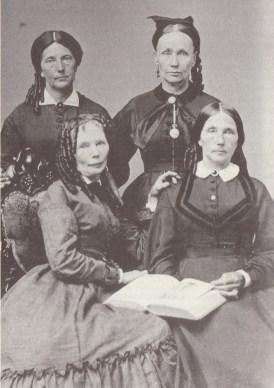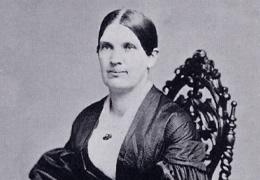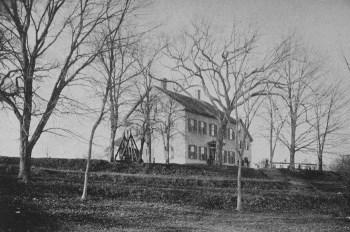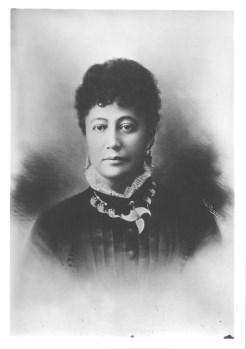Suffragist and the First Woman Minister in the United States Olympia Brown was a suffragist, the first woman to graduate from a theological school, and the first woman minister in the United States.* In 1863, the Universalist Church ordained Brown, the first woman ordained by that denomination. She was also one of the first generation suffragists who survived long enough to vote after the Nineteenth Amendment was passed in 1920. Image: Olympia Brown in 1919 *Antoinette Brown Blackwell is often considered the first American woman minister (1853). She was ordained by a Congregationalist church in Butler, New York, but the Congregationalist denomination did not approve her ordination. Olympia Brown was fully ordained by the church; Blackwell was not. Early Years…

Delia Webster
Conductor on the Underground Railroad Delia Webster was a teacher and abolitionist in Kentucky, where she was a conductor on the Underground Railroad. Tried and convicted for helping runaway slaves in their escape to freedom, she was the first woman imprisoned for assisting fugitive slaves. Webster was also an artist, writer, and an independent woman, unusual for her time. Image: Delia (front left) with her sisters, clockwise Martha, Mary Jane, and Betsey Delia Ann Webster was born December 17, 1817, one of four daughters born to Benejah and Esther Bostwick Webster in Vergennes, Vermont. She attended the Vergennes Classical School, and began teaching school at 12 years of age. She then attended Oberlin College in Ohio, the first college in…
Women’s Rights After the Civil War
Feminists and Activists for Women’s Equal Rights Image: Executive Committee of the National Woman Suffrage Association (1869) Women fought for more than 200 years to obtain the rights that were guaranteed to men in the U.S. Constitution. When the nineteenth century began, a woman was not permitted to vote or hold office; she had few rights to her own property or earnings; she could not take custody of her children if she divorced; she did not have access to a higher education. Birth of Feminism In the 1830s, thousands of women were involved in the movement to abolish slavery. While working to secure freedom for African Americans, these women began to see legal similarities between their situation and that of…

Jane Hunt
An Organizer of the Seneca Falls Convention Jane and Richard Hunt of Waterloo, New York were philanthropists who supported human rights causes. They hosted the tea party that led to the first women’s rights convention at Seneca Falls, New York in July 1848. Image: Jane Hunt Jane Clothier Master was born June 26, 1812 in Philadelphia, Pennsylvania to Quakers William and Mary Master. At age thirty-three Jane Master married Richard Hunt in November 1845 and moved to Waterloo, New York, where she became a member of Richard’s extended family of Hunts, McClintocks, Mounts, Plants and Pryors. All of these families were Quakers who had migrated to Waterloo from Philadelphia or New York State.
Mary Thompson House
General Robert E. Lee’s Headquarters at Gettysburg Image: Thompson House before the Battle of Gettysburg This one and a half story stone house sits on Seminary Ridge, west of the town of Gettysburg, on the north side of the Chambersburg Pike. On July 1, 1863 General Robert E. Lee established his headquarters here. It was an ideal location, at the center and rear of the Confederate battle lines. Anna Mary Long was born on November 12, 1793 near Littlestown, Pennsylvania. Her first husband was named Daniel Sell, with whom she had three daughters. Sell died at the age of 30 in 1822. Four years later she married Joshua Thompson, with whom she would have two sons and three daughters. Joshua…

Women of Brook Farm
A Massachusetts Commune Image: Farmhouse at Brook Farm Brook Farm, the most famous utopian community in America, was founded by Unitarian minister and author George Ripley and his wife Sophia in rural West Roxbury, Massachusetts in 1841. The Ripleys were interested in a more balanced society where equality was the norm and class distinction and wage discrepancy were not. The Philosophy In October 1840, George Ripley announced to the Transcendental Club that he was planning to form a Utopian community. Brook Farm, as it would be called, was based on the ideals of Transcendentalism. Poet Ralph Waldo Emerson was the center of the transcendental movement, setting out most of its ideas and values in a little book entitled Nature (1836)…
Lucretia Crocker
Pioneer Educator and Innovative Administrator As the first woman appointed to the Board of Supervisors of the Boston Public School System (1876), Lucretia Crocker pioneered the method of teaching mathematics and the natural sciences during her decade-long tenure. Earlier, she was among the first women elected to the Boston School Committee, and a strong advocate for higher education for women. Early Years Lucretia Crocker was born December 31, 1829 in Barnstable, Massachusetts on Cape Cod to Henry and Lydia Ferris Crocker. She was educated in the Boston Public Schools, and attended the State Normal School in West Newton, Massachusetts. Established by Horace Mann, it was the first state-supported school dedicated to training teachers in America. She graduated in 1850, but…

Graceanna Lewis
Pioneer Scientist and Abolitionist Graceanna Lewis was an early female natural scientist who became an expert in the field of ornithology (the study of birds). She is also remembered as an activist in the temperance, women’s suffrage and antislavery movements, and her home was a station on the Underground Railroad. Image: Graceanna Lewis, circa 1865 Chester County Historical Society, West Chester, PA. Early Years Graceanna Lewis was born August 3, 1821 on a farm in Chester County Pennsylvania, second of four daughters of Quaker farmers John Lewis and Esther Fussell Lewis. John died in 1824, leaving the children in the care of their mother, who endured a lengthy battle for control of the estate left to her by her husband.
Euphemia Goldsborough
Confederate Nurse and Smuggler from Maryland Euphemia Goldsborough exemplifies the Southern woman committed to the Confederacy. Against all odds and at great risk to her own personal safety, she smuggled necessities into Southern hospitals and Northern prisons. Her story is one of courage, compassion and endurance. Image: Euphemia Goldsborough at age 38 Early Years Euphemia Goldsborough was born June 5, 1836 at Boston, the family farm on Dividing Creek in Talbot County, Maryland. Euphemia was one of eight children born to Martin and Ann Hayward Goldsborough. She studied at a girls’ boarding school in Tallahassee, Florida during the 1850s, and then joined her family at their new home in Baltimore, Maryland. Leading up to the Civil War, Marylanders had mixed…

Bernice Pauahi Bishop
Hawaiian Princess and Philanthropist Princess Bernice Pauahi Bishop was a Hawaiian princess and the last direct descendant of the Royal House of Kamehameha. She is also remembered as one of the most remarkable philanthropists in the history of the Islands. Her bequest endowed the Kamehameha Schools, which specializes in educating the children of native Hawaiians. Early Years Pauahi Paki was born December 19, 1831 in Honolulu, Hawaii, to high chiefs Abner Paki and Laura Konia Paki. She was the great-granddaughter of Kamehameha I, the warrior chief who united the Hawaiian islands under his rule in 1810. Pauahi was reared with strong Hawaiian values and a bicultural education. She was gifted in music, and known for her generosity and kindness.